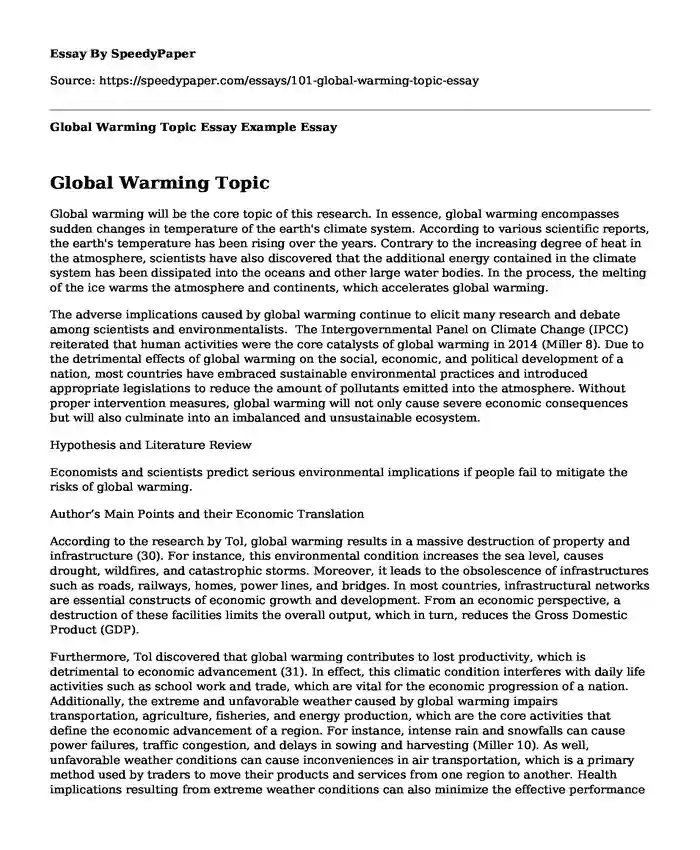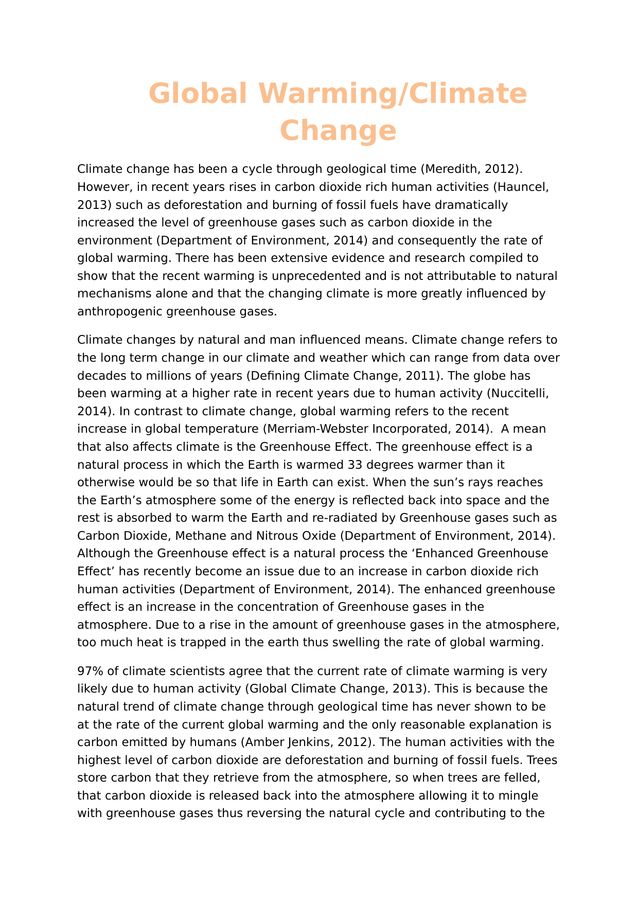Global warming is the gradual increase in Earth’s temperature due to greenhouse gas emissions. It poses a significant threat to the planet’s ecosystems and climate patterns.
The effects of global warming are already being felt worldwide, leading to rising sea levels, extreme weather events, and shifts in biodiversity. Understanding the causes and consequences of global warming is crucial in addressing this pressing environmental issue. In this composition, we will explore the key factors contributing to global warming, the impact it has on our planet, and the urgent need for sustainable solutions to mitigate its effects.
By raising awareness and taking collective action, we can work towards a more sustainable future for generations to come.

Credit: www.studypool.com
Causes Of Global Warming
Global warming is primarily driven by human activities that release greenhouse gases into the atmosphere, contributing to the trapping of heat and the consequent rise in global temperatures. Let’s delve into the key factors fueling this planetary crisis.
Greenhouse Gases:
Carbon dioxide (CO2), methane (CH4), nitrous oxide (N2O), and fluorinated gases act as greenhouse gases, absorbing and emitting radiation within the atmosphere.
Deforestation And Land Use Changes:
The clearing of forests for agriculture, logging, and urban development reduces carbon sequestration ability and releases stored carbon into the atmosphere.

Credit: www.studypool.com
Impact On Climate
Impact on Climate: Global warming has severe repercussions on Earth’s climate system, leading to various disruptions. Let’s explore the consequences of global warming on the climate through two critical aspects: Rising Temperatures and Changes in Precipitation Patterns.
Rising Temperatures:
- Accelerated melting of ice caps and glaciers.
- Shifts in wildlife habitats due to warmer climates.
- Increased frequency of heatwaves and droughts.
Changes In Precipitation Patterns:
- Altered rainfall distribution impacting agriculture.
- Intensified rainfall leading to floods and landslides.
- Widespread water scarcity in regions experiencing drought.
Effects On Ecosystems
Global warming has a profound impact on our planet’s ecosystems, leading to a range of detrimental effects. The disruption of natural habitats and threats to biodiversity are among the most concerning repercussions.
Disruption Of Natural Habitats
The rise in global temperatures causes disruptions in the natural habitats of various species. This can lead to changes in the distribution of plants and animals, affecting their traditional ecosystems. These changes often lead to imbalances in food chains and interaction between species, further impacting the delicate balance of ecosystems.
Threats To Biodiversity
Global warming poses a significant threat to biodiversity worldwide. The alterations in climate and habitat conditions can lead to reduced biodiversity in many regions. This means that various species are at risk of extinction as they struggle to adapt to the changing environment, further endangering the intricate web of life on Earth.
Human Health Impacts
Global warming composition has far-reaching impacts on various aspects of our lives, one of the most significant being on human health. The rise in average global temperatures due to the increasing concentration of greenhouse gases in the atmosphere poses several threats to our well-being. The following section explores two key areas where global warming directly affects human health.
Heat-related Illnesses
The rise in global temperatures has led to an increase in heat-related illnesses, posing a significant risk to individuals, particularly in areas with extreme heat conditions. Heatwaves have become more frequent and intense, exposing people to prolonged periods of extreme heat. These conditions can result in various adverse health effects, such as heat exhaustion, heat cramps, and in severe cases, heatstroke.
Increased Disease Transmission
Global warming also contributes to the increased transmission of diseases, particularly those carried by vectors like mosquitoes and ticks. As temperatures rise, the geographic distribution and population density of disease-carrying vectors expand, exposing more people to the risk of infections. For instance, the warmer climate has led to the spread of diseases like malaria, dengue fever, Lyme disease, and Zika virus.
Global Warming Mitigation
As climate change becomes an increasingly urgent global concern, it is vital that we take proactive measures to mitigate the effects of global warming. Global warming mitigation refers to the efforts made to reduce greenhouse gas emissions and slow down the overall warming of the planet.
Renewable Energy Adoption
The adoption of renewable energy sources plays a pivotal role in global warming mitigation. By transitioning away from fossil fuels and embracing cleaner alternatives, such as wind, solar, hydro, and geothermal power, we can significantly reduce our carbon footprint. Renewable energy offers numerous benefits, including lower emissions, decreased dependence on fossil fuels, and the potential for sustainable and long-term energy solutions.
Carbon Emission Reduction Strategies
To combat global warming effectively, it is imperative to implement strategies that focus on reducing carbon emissions across various sectors. These strategies can encompass a wide range of initiatives, such as:
- Improving energy efficiency in buildings and transportation systems to minimize energy waste and lower emissions.
- Promoting sustainable agricultural practices that reduce methane emissions from livestock and minimize the use of synthetic fertilizers.
- Encouraging afforestation and reforestation efforts to enhance carbon sequestration and offset emissions.
- Enhancing waste management systems, including recycling and composting, to reduce methane emissions from landfills.
By adopting and implementing these carbon emission reduction strategies, we can make substantial progress in mitigating global warming and creating a cleaner, more sustainable future.
International Agreements And Policies
International Agreements and Policies play a crucial role in addressing the pressing issue of global warming. These agreements serve as a framework for countries to collaboratively work towards mitigating the effects of climate change. Key agreements such as the Paris Agreement and the Kyoto Protocol have been instrumental in shaping global efforts to combat global warming.
Paris Agreement
The Paris Agreement stands as a landmark international accord aimed at combating climate change. It was adopted in December 2015 and came into force in November 2016. The core aim of the agreement is to limit global temperature increase well below 2 degrees Celsius above pre-industrial levels, with an aspirational target of limiting the increase to 1.5 degrees Celsius.
Kyoto Protocol
The Kyoto Protocol was an international treaty that committed industrialized countries to reduce their greenhouse gas emissions. It was adopted in Kyoto, Japan, in 1997 and came into force in 2005. The protocol set binding targets for 37 industrialized countries and the European Union, aiming to reduce their collective greenhouse gas emissions by 5.2% compared to the 1990 levels over the commitment period of 2008-2012.
Adaptation And Resilience
As the impacts of global warming become increasingly severe, adaptation and resilience are crucial elements in combating its effects.
Community-based Initiatives
Local communities play a vital role in implementing sustainable practices and fostering resilience against climate change.
Infrastructure Resilience Planning
Infrastructure resilience planning is essential in ensuring that our cities and systems can withstand the challenges posed by climate change.

Credit: speedypaper.com
Frequently Asked Questions For Global Warming Composition
What Are The Main Causes Of Global Warming?
The main causes of global warming include the burning of fossil fuels, deforestation, and industrial activities. These activities release greenhouse gases into the atmosphere, trapping heat and raising the Earth’s temperature.
How Does Global Warming Affect The Environment?
Global warming causes a range of environmental impacts such as rising sea levels, extreme weather events, and species extinction. It disrupts ecosystems, damages coral reefs, and threatens food security, leading to significant long-term consequences for the planet.
What Can Individuals Do To Reduce Global Warming?
As individuals, we can play our part in reducing global warming by conserving energy, using public transportation, recycling, and supporting renewable energy sources. Making small changes to our daily habits can have a positive impact on the environment and slow down the pace of global warming.
Conclusion
In sum, the urgency of addressing global warming is evident. With rising temperatures, extreme weather events, and melting ice caps, the need for immediate action is paramount. It is essential that individuals, businesses, and governments collaborate to embrace sustainable practices to mitigate the impact of climate change.
Together, we can work towards a healthier and more sustainable future for our planet.







